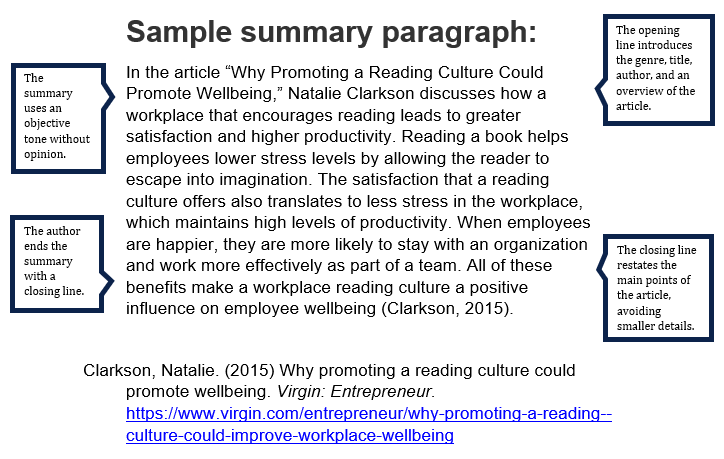A summary begins with an introductory sentence that states the text's title, author and main point of the text as you see it. A summary is written in your own words. A summary contains only the ideas of the original text. Do not insert any of your own opinions, interpretations, deductions or comments into a summary.The most important tense for a summary is the simple present. Actions happening one after the other are in simple present. Note, however, that you have to use different tenses for everything happening at the same time or before. Some summaries are written in simple past.The act of summarizing is much like stating the plot of a play. For instance, if you were asked to summarize the story of Shakespeare's 'Hamlet,' you might say: It's the story of a young prince of Denmark who discovers that his uncle and his mother have killed his father, the former king.

How to write a good summary : How To Write a Summary in Five Easy Steps
- Read and take notes. First things first: Read or watch the original work you'll be summarizing.
- Start with an introductory sentence.
- Explain the main points.
- Organize your summary to ensure a smooth flow.
- Conclude by restating the author's thesis.
How long is a simple summary
A summary is a brief description of the main points of a work written in "your own words. As a general rule, a summary should be one-fourth the length of the 1-3 page original work.
Can you do 10 sentences in simple present : Izzy drinks milk every night before going to bed. Johnny goes to the gym daily. We go to school daily. Smita reads the newspaper every day.
A summary must be concise: Eliminate repetitions in your list, even if the author restates the same points. Your summary should be considerably shorter than the source. You are hoping to create an overview; therefore, you need not include every repetition of a point or every supporting detail.
Simple sentences in the Present Simple Tense
- I'm happy.
- She exercises every morning.
- His dog barks loudly.
- My school starts at 8:00.
- We always eat dinner together.
- They take the bus to work.
- He doesn't like vegetables.
- I don't want anything to drink.
What are 5 examples of present sentence
Examples
- He goes to school every morning.
- She understands English.
- It mixes the sand and the water.
- He tries very hard.
- She enjoys playing the piano.
- Step 1: Read the text. You should read the article more than once to make sure you've thoroughly understood it.
- Step 2: Break the text down into sections.
- Step 3: Identify the key points in each section.
- Step 4: Write the summary.
- Step 5: Check the summary against the article.
Examples are:
- The book was on the table.
- We camped by the brook.
- He knew it was over the rainbow.
- She was lost in the dark of night.
- He was between a rock and a hard place.
- I waited for a while.
- She smelled of strawberries and cream.
- He won the challenge against all odds.
1. Simple Sentences
- Joe waited for the train. "Joe" = subject, "waited" = verb.
- The train was late. "The train" = subject, "was" = verb.
- Mary and Samantha took the bus.
- I looked for Mary and Samantha at the bus station.
- Mary and Samantha arrived at the bus station early but waited until noon for the bus.
What are 10 examples of sentences using in : Preposition: IN
- “I always brush my teeth in the morning.”
- “My birthday is in June.”
- “It's always cold in winter.”
- “My brother was born in 1999.”
What are 10 present tense sentences : Simple Present Tense Examples Used to Denote Habitual Actions
- Raj eats bread and butter before going to school.
- Emma watches cartoons every day.
- Izzy drinks milk every night before going to bed.
- Johnny goes to the gym daily.
- We go to school daily.
- Smita reads the newspaper every day.
What is a good example of a summary
The act of summarizing is much like stating the plot of a play. For instance, if you were asked to summarize the story of Shakespeare's 'Hamlet,' you might say: It's the story of a young prince of Denmark who discovers that his uncle and his mother have killed his father, the former king.
Answer: Summary is defined as a quick or short review of what happened. An example of summary is the explanation of "Goldilocks and the Three Bears" told in under two minutes. A brief statement or account covering the substance or main points; digest; abridgment; compendium.My school starts at 8:00. We always eat dinner together. They take the bus to work. He doesn't like vegetables.
What are the 4 common types of phrases : Types of Phrases – Key takeaways
The different types of phrases include: noun phrase, adjective phrase, adverb phrase, verb phrase, and prepositional phrase. A noun phrase is a group of words that consists of a noun (or pronoun) and other words that modify the noun. It adds information about the noun.


